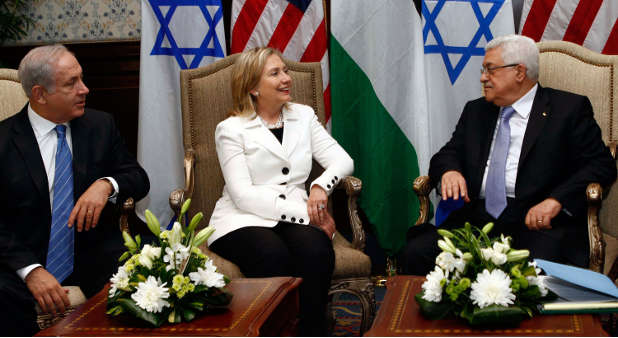Sen. Bernie Sanders is surging in the polls, but Hillary Clinton has long been the front-runner for the Democratic nomination in the 2016 presidential race. If elected, how would U.S.-Israel relations fare under her watch?
To gain insight into the prospect of a Clinton administration for the Jewish state, JNS.org looks back—in reverse chronological order—at her words, policies and relationships as they relate to Israel over the course of the various stages of her political career.
Secretary of State and U.S. President Candidate
2016
In the latest Democratic presidential debate, Clinton disagrees with an assertion by Sanders that “what we’ve got to do is move as aggressively as we can to normalize relations with Iran.” While Clinton expresses that she is “very proud” of the newly implemented nuclear deal between Iran and world powers, she cautions, “We’ve had one good day over 36 years, and I think we need more good days before we move more rapidly—before more normalization.” Israeli leaders across the political spectrum have opposed the Iran deal over security concerns.
2015
In November, Clinton appoints Earl F. Hilliard—a former House of Representatives member who blamed an election defeat on “Jewish interests” and the “Jewish media”—to her presidential campaign’s Alabama leadership team. Hilliard was considered one of the most vocal opponents of Israel in Congress while he represented Alabama in the House from 1993-2003.
The Wall Street Journal reports that Clinton and her campaign team “have regularly reached out to opponents of the Iran deal in recent weeks, including American Jewish leaders. The outreach to the Jewish community appears to be working. A number of Jewish leaders said they remained deeply concerned about the agreement but said Mrs. Clinton wasn’t facing the same type of criticism as Mr. [Barack] Obama.”
In July, former Israeli ambassador to the U.S. Michael Oren comes out with his much-discussed memoir, Ally: My Journey Across the American-Israeli Divide. Oren recalls being consistently rebuffed in his attempts to meet with Clinton during her time as secretary of state on the grounds that she “did not receive ambassadors,” in contrast to former secretary of state Condoleezza Rice’s willingness to regularly meet with Sallai Meridor, the Israeli envoy at the time.
In an op-ed for the Forward, Clinton writes, “I am deeply committed to Israel’s future as a secure and democratic Jewish state, and just as convinced that the only way to guarantee that outcome is through diplomacy. And while no solution can be imposed from outside, I believe the United States has a responsibility to help bring Israelis and Palestinians to the table and to encourage the difficult but necessary decisions that will lead to peace. As president I will never stop working to advance the goal of two states for two peoples living in peace, security and dignity.”
In March, Clinton says in a phone conversation with Malcolm Hoenlein, executive vice chairman of the Conference of Presidents of Major American Jewish Organizations, that “we need to all work together to return the special U.S.-Israel relationship to constructive footing.” The U.S. and Israel, she says, should “get back to basic shared concerns and interests, including a two-state solution pursued through direct negotiations between Israelis and Palestinians. … We must ensure that Israel never becomes a partisan issue.”
2014
In her new memoir, Hard Choices, Clinton characterizes Israel as an occupying force. “When we left the city and visited Jericho, in the West Bank, I got my first glimpse of life under occupation for Palestinians, who were denied the dignity and self-determination that Americans take for granted,” she writes, recounting a 1981 trip with her husband.
Clinton also writes in the memoir: “In retrospect, our early, hard line on settlements didn’t work,” arguing that the Obama administration’s stance against Israeli settlement construction hardened Palestinian Authority President Mahmoud Abbas’s position. But Noah Pollak, executive director of the Emergency Committee for Israel (ECI), writes for the Weekly Standard that Clinton was trying to rewrite her position on settlements. “It is very difficult, looking at her record during this period, to conclude that the presentation of her role in her book is accurate,” writes Pollak. “There is a simple and likely explanation for this revisionist history: She knows that her prominent role in the past five years of acrimony between the Obama administration and Israel is unhelpful to her presidential ambitions, and so she is attempting to distance herself from the administration’s record by downgrading her involvement in its Israel policy.”
A television advertisement from ECI questions Clinton’s silence on Secretary of State John Kerry’s comment in April that Israel risks becoming an “apartheid state” if a two-state solution to the Israeli-Palestinian conflict is not reached soon. The ad notes that American Jewish groups, Democratic Party organizations and Democratic legislators spoke out against Kerry’s remark, but Clinton did not.
2012
Speaking at the Saban Forum, Clinton says Israel lacks generosity and empathy in its approach to the Palestinian issue. “So, look, I’m not making excuses for the missed opportunities of the Israelis, or the lack of generosity, the lack of empathy that I think goes hand-in-hand with the suspicion,” she says. “So, yes, there is more that the Israelis need to do to really demonstrate that they do understand the pain of an oppressed people in their minds, and they want to figure out, within the bounds of security and a Jewish democratic state, what can be accomplished.”
Responding to an email containing a quote in which Netanyahu tells the Jerusalem Post, “We have two main enemies … the New York Times and Haaretz,” Clinton sarcastically replies, “Further Bibi lore.”
In an article published two months after the Obama administration brokers a nuclear deal with Iran in 2015, Jay Solomon and Laura Meckler write for the Wall Street Journal that three years earlier, “Hillary Clinton, in her last months as secretary of state, helped open the door to … an acceptance that Tehran would maintain at least some capacity to produce nuclear fuel.” In July 2012, according to the report, Hillary’s foreign policy aide Jake Sullivan “met in secret with Iranian diplomats in Oman, but made no progress in ending the dispute over Iran’s nuclear program. In a string of high-level meetings here over the next six months, the secretary of state and White House concluded that they might have to let Iran continue to enrich uranium at small levels, if the diplomacy had any hope of succeeding.”
2011
In an email dated Dec. 18, 2011, former U.S. Ambassador to Israel Thomas Pickering, an adviser to Clinton, suggests that the U.S. covertly generate Palestinian unrest in an effort to push the Israeli government to jump-start stalled peace talks. “What will change the situation is a major effort to use nonviolent protests and demonstrations to put peace back in the center of people’s aspirations as well as their thoughts, and use that to influence the political leadership,” Pickering writes, adding that Israeli Prime Minister Benjamin Netanyahu “cannot deliver anything the Palestinians can accept without our help.” It is unclear how Clinton reacts to Pickering’s idea.
Clinton expresses concern about the state of Israeli democracy, describing reports of gender segregation on buses operating in Jerusalem as “reminiscent of Rosa Parks,” the black civil rights icon who in 1955 refused to give up her seat on an Alabama bus to white passengers. Israeli finance minister Yuval Steinitz calls Clinton’s remark “completely exaggerated.”
2010
In March, Clinton devotes a 45-minute phone conversation with Netanyahu to rebuking the prime minister for Israel’s decision to move ahead with 1,600 new housing units in eastern Jerusalem.
Clinton confidante Sidney Blumenthal, in a memo to the secretary of state, offers what JNS.org columnist Rafael Medoff later calls an “armchair psychiatric analysis” of Netanyahu. Blumenthal writes in an email to Hillary that Netanyahu is haunted by the fear that he “can never equal his dead brother,” Entebbe rescue hero Yoni Netanyahu. The prime minister is obsessed with a feeling that he “has never measured up” to his brother in their father’s eyes, writes Blumenthal.
2009
In a September email to Sidney Blumenthal, Clinton praises Republican Gomorrah, a book written by Sidney’s son, anti-Israel activist and Hamas supporter Max Blumenthal. “I just finished the book, and it’s great. Congrats to all!” Clinton tells Sidney.
In May, Clinton tells Al Jazeera, “We want to see a stop to [Israeli] settlement construction, additions, natural growth—any kind of settlement activity. That is what the president has called for.” Later that month, at a press conference with Egypt’s foreign minister, Clinton says Obama “wants to see a stop to settlements—not some settlements, not outposts, not natural growth exceptions.”
Michael Oren writes in Ally that the 2009 demand by the Obama administration for a complete Israeli settlement freeze marked the “first time in the history of the U.S.-Israel alliance” that the White House “denied the validity of a previous presidential commitment.” Oren was referring to the George W. Bush administration’s reported commitment to Israel that the Jewish state could build inside the construction lines of established settlements. But according to an email made public by the State Department, Clinton in July 2009 writes to two aides that Bush-era Secretary of State Condoleezza Rice “called to tell me I was on strong ground, saying what I did about there being no agreement [on settlements] between the Bush admin[istration] and Israel.”
Note: Tune in Wednesday for Part 2 of this story, with a timeline from 2008 to 1974.
For the original article, visit jns.org.
See an error in this article?
To contact us or to submit an article























